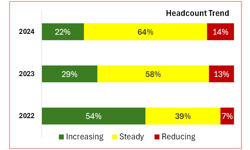The statement from Haymarket said: Masters (pictured) joined Haymarket as a salesman in 1958 and ended up running the company between 1970 and 1997 - while Michael Heseltine focused on his political career - before retiring in 1999. He built on the foundations of Haymarket to create the group it is today.
With the help of his chief executive Simon Tindall, Masters innovated by applying the quality and design of Town magazine - Britain's first modern consumer style title for men and which provided the basis of success for Haymarket - to trade magazines.
He subsequently led the launch of a number of specialist business titles, many of which have become market leaders: Campaign and Management Today to name just two. Their format has since been copied by many other publishers around the world.
Masters was responsible for growing the company from 400 employees in the early 70s, to a publishing group of over 1,500 people by the time Heseltine returned from politics in the late 90s.
Many of Lindsay’s great achievements at Haymarket are recounted in the story below written by Michael for Haymarket’s 50th anniversary supplement issue of Campaign magazine in 2007:
Haymarket 50 Years: Lindsay Masters - the perfectionist
Lindsay Masters joined Haymarket as a salesman and ended up running the company. Michael Heseltine recalls how his maverick attitude and perfectionism helped build the company's ethos.
In 1958, Clive Labovitch, my original partner in the Haymarket business, hired a young man called Lindsay Masters to sell space on a jobs directory. Two things about the newcomer were immediately evident. First, he was an extraordinarily effective salesman. Second, he looked and behaved nothing like a salesman at all. He belonged to what in those days we called the Chelsea Set: late nights, parties, jazz, the arts. But behind his rather louche exterior lay a mind of rapier sharpness and an unshakeable determination.
He had very clear ideas about selling. He always went directly to the client, refusing to talk to agents or subordinates. He was a pioneer of selling on the telephone, as opposed to the foot-in-the-door technique. He argued that if you made 30 phone calls a day and got through to the right person 20 per cent of the time, and then you presented your sales story to that person with unanswerable logic, those six contacts would yield more financial return than driving through congested streets to keep perhaps three or four face-to-face appointments.
Masters was also obsessed with the visual impact and presentation of our products. He believed that if you wanted to charge more for your space than your competitors, the quality of your publications should be higher too. When we launched Town, he was just the man to sell it. We wanted it to be a stylish, intelligent magazine designed to meet the mood of those early 60s, and it suited his character perfectly.
Espousing international standards of photography and graphic design, Town helped to change the face of consumer magazines in a British market that knew little of such things. It was never financially successful, but it represented a vital step in Haymarket's development, for its quality led to our contract to produce Management Today, the journal of the British Institute of Management.
Labovitch's departure in 1965 changed the relationship between Masters and me. He became my number two, and then my managing director. He was now very different from the young salesman Labovitch had hired almost ten years earlier, involving himself with every part of the process with the same uncompromising individualism.
When we bought Worlds Press News, I knew what could be done with it. I handed a copy to Masters and said: "Ad Age." But I couldn't have done it myself. It was his vision of a business weekly filled with high quality writing, fine photography and elegant design - at a time when trade magazines were almost universally dull and lifeless - that turned WPN into Campaign.
He followed it with a number of similar specialist titles, many of which became market leaders. Their format was to be copied by scores of other publishers around the world.
By 1970, politics had taken me away from Haymarket, and it was Masters who ran and grew the company, operating it tightly and effectively. He always insisted on those high standards in its ever-growing stable of specialist business and consumer titles, whether they were aimed at computer programmers or caravanners. The pleasure he took in well-composed copy was matched only by his refusal to tolerate average, workaday words. His unerring eye for good design (both his parents had been artists) was matched by an ability to hire talented art directors, and the courage to back their most innovative proposals, as long as he felt that those proposals showed clarity, elegance and originality.
From the beginning, Masters retained his maverick refusal to conform. He believed that it wasn't enough to be better than the competition: you also had to be different. To him, the acknowledged rules of magazine publishing led the way to predictability and dullness, and the best solutions to any business problem were the most creative ones. On a personal level, this non-conformity manifested itself in minor eccentricities: he never owned a briefcase, preferring to carry confidential documents and company financial figures around in a succession of plastic supermarket bags.
His staff would tell you that if you incurred his wrath because you'd failed to come up to his own high standards, he could be terrifying; yet he always preferred robust argument from his subjects to mute acceptance. But unlike most salesmen, he was very difficult to sell to, for he could immediately pounce on the weak point in any pitch.
His dedication to quality, and his delight in being different, suffused the whole company, and were constant ingredients in Haymarket's growth and success. We had 400 employees when I left in 1970. When I returned full-time in 1997, it was to a publishing group of 1,500 people, which was not only in rude health but also remained wedded to the same philosophies of quality and original creative thought.
The responsibility for that gene in the company's DNA lies principally with Lindsay Masters.
This article was first published in Campaign










